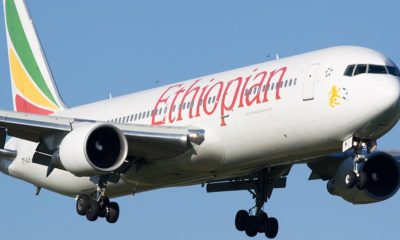- Ethiopian Airlines Offers to Partner Nigeria on National Carrier
Ethiopian Airlines has expressed its preparedness to partner Nigeria on the federal government’s planned national carrier.
The airline said a country with such huge passenger traffic needs government-backed airline, saying that it has all it takes, including technical know-how, equipment and personnel to partner with the planned carrier.
Ethiopian Airlines Managing Director, International Services, Mr. Esayas Haliu, who spoke to a team of Nigerian journalists in Addis Ababa, said the airline has succeeded in all it had established with many countries in Africa.
Hailu, said as the largest economy in Africa, with such huge population, which he described as most precious, Nigeria truly deserves a national carrier.
“There have been attempts to off-load some bids for foreign airlines by Nigerian government, Ethiopian has always been participating in that but so far, we have not been picked but we are able, capable and ready and whenever the vacancy is created, we are ready to come for any partnership.
“Secondly, Nigeria has been a very good host and by their volume of the population which is demography dividends, the most precious resource is the human resource, the largest economy, the mobility is very high both domestically and foreign, for that; Nigeria really requires a national carrier, we wish them success, if we are required to support, we are ready and willing to do that, any partnership that arises from that is most welcome and we are in expectation of that”, he said.
The East African carrier also hinted that it plans to introduce a second frequency into Lagos, through the Murtala Muhammed International airport, adding that it plans to connect the United States of America from Nigeria, subject to approval by the Nigerian government.
On the Single African Air Transport Market (SAATM), Haliu said the success of the treaty was the key to reducing the dominance of international mega carriers, which have 80 per cent of the African travel market and enhancing connectivity in Africa.
He noted that Africa has only three per cent of the global air travel market and 80 per cent of that market was dominated by international carriers, leaving African carriers with only 20 per cent.
According to him, the full implementation of SSATM would free the market from mega carriers, as the treaty guarantees access to African airlines to all signatory nations.
“When Single African Transport management which is advocated by African Union commission, when that one comes people think that only a few airlines will benefit from that, No!
“As we are speaking, 80 per cent of African traffic is taken by non-Africans, so all of us put together we have only 20 per cent so we need to attack that 80 per cent.
“We need to eclipse, 80 per cent should be African airlines and 20 per cent should be non-African airlines. This is our continent, that is our traffic and so for more African countries to come, the traffic, which is not in the hands of the African airlines is much more.
“So we have a lot more to play with, it’s not as if we have to scramble that same 20 per cent. No! We don’t settle for that and we want to contribute more than three per cent of the global air traffic which we are doing now, it’s only three per cent.”
He said it was in the bid to make such major contribution that Ethiopia Airlines is going to every African country and helping to establish regional national carriers.
According to him, if SAATM was fully implemented one of its benefits would be to redistribute wealth by reducing capital flight from Africa to non-African countries.
“All this effort is for African airlines to grow, thrive and dominate the 80 per cent of the market so that employment, taxes, revenue, opportunity the capital sinks in the African continent and does not fly away.
He, however, expressed dissatisfaction about the uncooperative stance of some African countries preferring to sell traffic rights to non-African countries at the detriment of African carriers.
“Right now, many of the African nations have been given traffic rights to non -African nations more and when fellow Africans ask they deny them services.
“So, SAATM is a very good solution for Africa to put its hands together, organise itself together and to thrive, so SAATM is the best thing that can happen to Africa because air traffic connectivity is a tool for economy, cultural exchange, tourism, regional tourism as well as people and goods transaction,” he said.

 Naira3 weeks ago
Naira3 weeks ago
 News4 weeks ago
News4 weeks ago
 Naira4 weeks ago
Naira4 weeks ago
 Jobs4 weeks ago
Jobs4 weeks ago
 Naira3 weeks ago
Naira3 weeks ago
 Travel3 weeks ago
Travel3 weeks ago
 Naira3 weeks ago
Naira3 weeks ago
 Investment4 weeks ago
Investment4 weeks ago






















